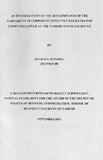| dc.description.abstract | In the developed economies, one of the driving forces behind tax reforms was the concern that many large corporations, indeed many industries were not paying their “fair” share of taxes. These were fired by the many studies showing that many large corporations paid little or no tax; studies pounced on by the media and politicians to agitate for tax reforms. Concern with equity in taxations as well as tax planning is important since they affect location decisions of firms and the flow of Foreign Direct Investment (FDI). Regulators also find this important in making taxation policies that ensure that balanced economic goals of the country are met.
The purpose of the study was to establish the relationship between Effective Tax Rates and selected corporate characteristics (namely, size, capital structure, asset mix and firm performance). This was an analytical study which used panel data to measure. Thus the study adopted a time series or longitudinal approach, supplemented by cross-sectional comparisons. In this paper, we used data for the 38 companies listed on the Nairobi Stock Exchange (NSE) for the period (2005-2009). Effective tax rates were then correlated to firm size in order to test the size effect. Sensitivity analysis using OLS regression was also performed.
The study concludes that firm size, leverage of the company, capital intensity and return on total assets influences the effective tax rates. However the study deduced that leverage negatively influenced the effective tax rates. The managers of the companies should concentrate their efforts towards allocating more funds to the expansion of the firm size as larger firms do possess superior economic and political power relative to smaller firms and are able to reduce their tax burdens. The companies should rely more on equity based financing to support its business operations other than relying more heavily on debt financing. The study also recommends that since it was established that firms that are more capital-intensive are expected to have lower ETRs, the companies should strive to ensure that they are more capital-intensive and less inventory- intensive. | en_US |

